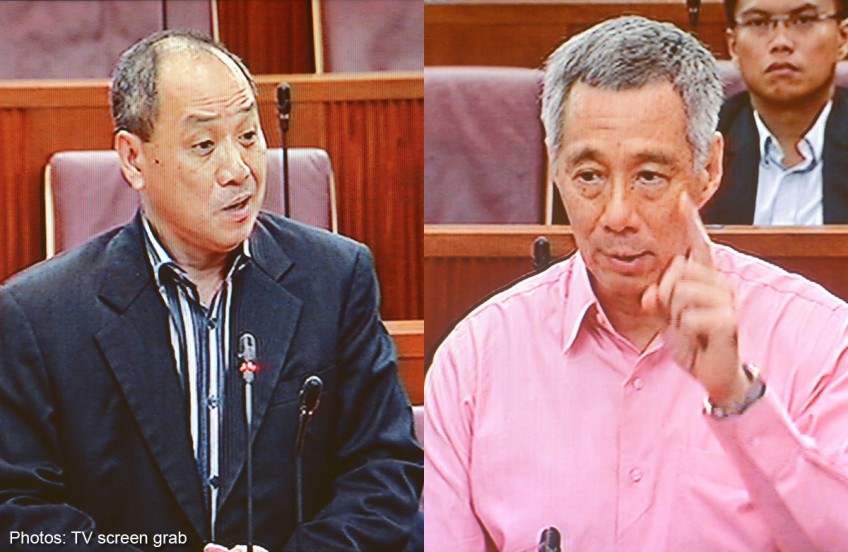Parliament: The debate in 2 minutes

ON THE AGENDA
On Day Three of the debate on the President's Address, Prime Minister Lee Hsien Loong gave a progress report on housing, public transport, foreign worker inflows and social safety nets.
He also sparred with Workers' Party chief Low Thia Khiang over constructive politics and the way in which the opposition party conducts itself in Parliament.
On constructive politics
Mr Lee defines constructive politics this way: It develops effective policies, puts forward good people to lead, has a robust and open debate, maintains high standards of integrity and rallies people around a common cause.
He said like the PAP, the opposition must uphold the same standards, as he charged the WP with flip-flopping on foreign worker inflows.
Mr Low (Aljunied GRC) said that when his party had said its piece, it respected the Government's decision to move on and did not want to "jam" it up.
Mr Lee also took the WP to task for not offering concrete policy ideas and making its stand clear. A stand of "what the PAP is doing and a little better" is not a stand, he said.
The WP has no intent to hide itself in Parliament, said Mr Low, but it takes a rational and responsible approach.
Retiring with ease
Mr Lee promised more help for Singaporeans to retire with ease. Announcements about MediShield Life and better Central Provident Fund annuity payouts are due in the next few months. The Government will also raise the re-employment age beyond 65 and help them to unlock the savings in their flats.
Affordable homes
Housing will stay affordable for Singaporeans, Mr Lee said. The Government will also continue to subsidise public transport costs, but commuters must be prepared to pay their share, he added.
To stagger the demand for foreign workers, more than $2 billion in public construction projects will be deferred for one or two years, except for urgent projects like HDB flats, Mr Lee said.
Shaping school ethos
Mr Lee promised more measures to shape the culture and ethos in schools, so that rich and poor students interact comfortably with one another.
Primary schools must set aside at least 40 spaces for pupils with no prior ties to the school. Schools will exercise restraint in building facilities and organising activities, so that poor students are not put off from enrolling in them.
Malays in leadership positions
Dr Intan Azura Mokhtar (Ang Mo Kio GRC) cited official statistics to show that more Malays are in leadership positions in the private and public sectors, and the uniformed services over the last 50 years. But the view that Malays have fewer opportunities for promotion or leadership still exist, she said.
Access to justice for the poor
Ms Sylvia Lim (Aljunied GRC) wants the poor to have more access to justice by ensuring that an upcoming plea-bargaining framework grants people legal representation even if they cannot afford a lawyer. Also, have the courts consider non-monetary bail, so that those charged can better prepare their defence.
Keep collective vision in sight
Civil society and the Government can be strong partners as long as all parties are open-minded, said Minister of State for National Development Desmond Lee.
Singaporeans should not lose sight of their collective vision, said Mr Seah Kian Peng (Marine Parade GRC). Mr Hri Kumar Nair (Bishan-Toa Payoh GRC) noted that most Singaporeans believe politics is a noble cause, and are not as cynical about politics as people in many "mature democracies".
The debate continues today.

Get a copy of The Straits Times or go to straitstimes.com for more stories.